 Petzlover
Petzlover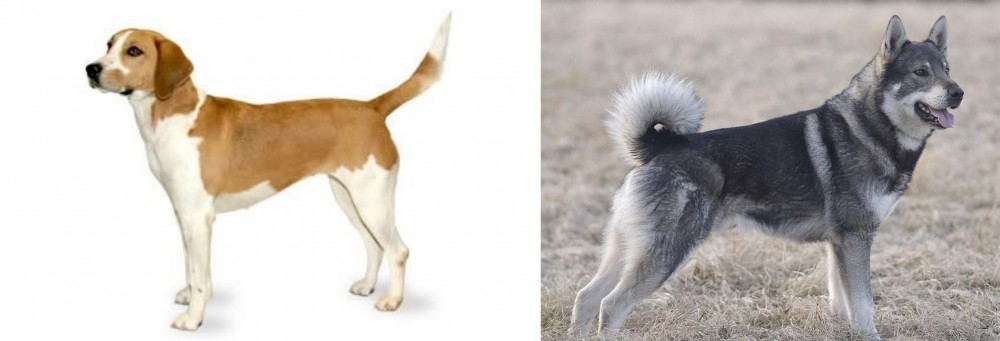 Harrier is originated from United Kingdom but Jamthund is originated from Sweden. Harrier may grow 15 cm / 5 inches shorter than Jamthund. Harrier may weigh 8 kg / 17 pounds lesser than Jamthund. Harrier may live 3 years more than Jamthund. Harrier may have less litter size than Jamthund. Both Harrier and Jamthund requires Moderate Maintenance.
Harrier is originated from United Kingdom but Jamthund is originated from Sweden. Harrier may grow 15 cm / 5 inches shorter than Jamthund. Harrier may weigh 8 kg / 17 pounds lesser than Jamthund. Harrier may live 3 years more than Jamthund. Harrier may have less litter size than Jamthund. Both Harrier and Jamthund requires Moderate Maintenance.
 Developed in Great Britain, the Harrier is another hunting dog – a hound that primarily hunts hares and small prey. The breed itself is medium sized - smaller than an English Foxhound and larger than a Beagle. Although the definitive origins of the Harrier are not set, it is believed that he is a cross of the Basset Hound, Talbot Hound and Bloodhound. Others believe the breed is a cross of the Greyhound and the English Foxhound. The Harrier looks like a smaller version of the English Foxhound.
Developed in Great Britain, the Harrier is another hunting dog – a hound that primarily hunts hares and small prey. The breed itself is medium sized - smaller than an English Foxhound and larger than a Beagle. Although the definitive origins of the Harrier are not set, it is believed that he is a cross of the Basset Hound, Talbot Hound and Bloodhound. Others believe the breed is a cross of the Greyhound and the English Foxhound. The Harrier looks like a smaller version of the English Foxhound.
The Harrier is a pack dog and in 1260, Sir Elias de Midhope established the first pack in England. From there the breed spread to Wales and Western England, most used in Ireland where they hunt fox as well as hares. However, hunting hares is the specialty of the breed and even gave the breed its name. In 1885 they were recognized by the American Kennel Club in the Hound Group. Yet despite this and despite the number of Harriers working in England, they are not recognized by the UKC.
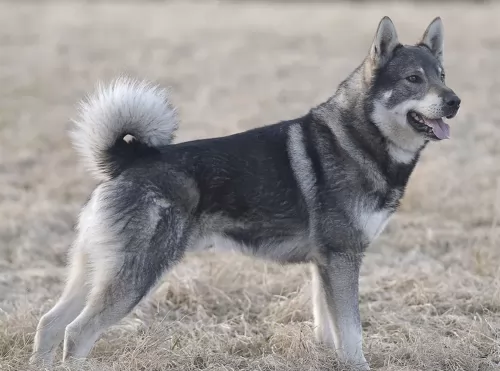 Known also as the Swedish Elkhound or Swedish Moosehound, the Jämthund is a dog which hails from Sweden, and more specifically from a region known as Jamtland.
Known also as the Swedish Elkhound or Swedish Moosehound, the Jämthund is a dog which hails from Sweden, and more specifically from a region known as Jamtland.
The dog received official recognition in 1946 as a dog breed from the Swedish Kennel Club. DNA testing tell us that these dogs originated from the crossing of a wolf, being described as a ‘Spitz-type dog’.
They were once used to pull sleds, and its why today he is an energetic dog, requiring a good dose of exercise and activities from his owners. The UKC accepted the dog as an official breed in 2006.
 The Harrier is a typical hound dog much like the English Foxhound. The breed is a little smaller than the Foxhound but is muscular and large boned like his cousin. They have short hard hair that sheds and ears that hang. The Harrier is a large boned breed built for strength and stamina in the race with hares. They have broad skulls, strong muzzles, with hazel or brown eyes. They also have a black, wide nose and a high, medium length tail.
The Harrier is a typical hound dog much like the English Foxhound. The breed is a little smaller than the Foxhound but is muscular and large boned like his cousin. They have short hard hair that sheds and ears that hang. The Harrier is a large boned breed built for strength and stamina in the race with hares. They have broad skulls, strong muzzles, with hazel or brown eyes. They also have a black, wide nose and a high, medium length tail.
They say he has a ‘courtly grin’ on an expressive face. Being pack dogs, they must be sturdy, able to cover any type of terrain, for as long as the hare runs. It is critical that their scenting and running tools are exceptional. He is blue or yellow-pied. His feet are cat like and the chest is dropped low. He is an extremely well-proportioned dog
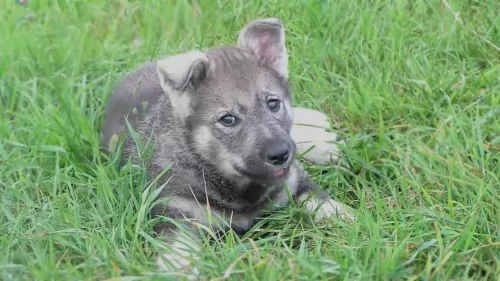 Described as a medium to large sized dog, the Jamthund stands at about 52 – 65cm in height, both males and females, and they weigh in at about 25 to 35 kilograms.
Described as a medium to large sized dog, the Jamthund stands at about 52 – 65cm in height, both males and females, and they weigh in at about 25 to 35 kilograms.
They have that typical Spitz-dog tail which curls over the back of the dog. When relaxed the tail hangs straight down. He has erect ears with a longish muzzle, much like a wolf, and his double coat lies fairly close to the body while on certain areas of the body, such as around the neck and tail, it is longer.
The color of his coat is usually light or dark grey with some cream marking around the muzzle, eyes, legs and paws. This fairly large, Spitz-type dog is certainly an attractive dog that while looking similar to a wolf shares some physical features with the Norwegian Elkhound.
Capable of being a splendid family pet, the Jamthund is an affectionate, loyal dog with his human family, although it is true that some of him hankers back to his hunting days.
He is an intelligent, amicable dog, and therefore training and socializing him is easy as he wants to please.
He is very energetic and won't be content with a life curled up indoors. He wants to be busy and involved with all your activities such as walks, hikes and swimming. He has a thick coat and he loves wintry weather, so the cold won’t stop him from wanting a long walk every day.
 Yes, they are good with children but are very rambunctious and should be supervised with young children.
Yes, they are good with children but are very rambunctious and should be supervised with young children.
Scenting ability and wonderful personality
This breed is very adaptable as long as it gets enough exercise. He can live in the country or she can live in the city with an outlet for exercise.
Smart but stubborn at times. Therefore, his learning ability is moderate.
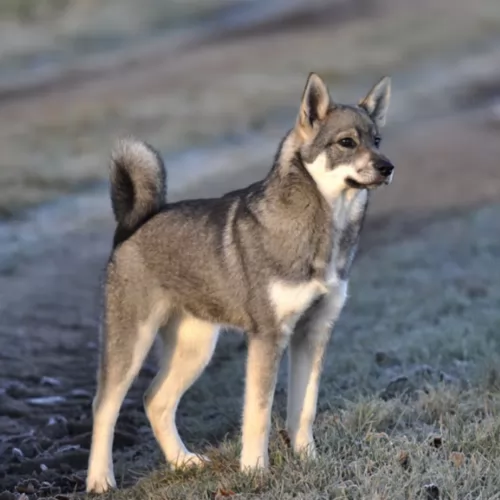 Loving the company of his human family, the Jamthund gets lonely, bored and frustrated if he is put into the backyard as a watchdog and left. When he becomes naughty it is because he is trying to tell you that he wants to be part of your life.
Loving the company of his human family, the Jamthund gets lonely, bored and frustrated if he is put into the backyard as a watchdog and left. When he becomes naughty it is because he is trying to tell you that he wants to be part of your life.
The Jämthund has excellent hunting skills and with his great intelligence too and his ability to learn easily, he makes a popular pet. He also has other attractive characteristics such as being brave and calm.
He forms a deep bond with his human family and his gentle nature makes him a favorite playmate of children too. They make good guard dogs as they are alert and protective of their human family.
Not only has the Jamthund got many positive characteristics to his name, he is an attractive dog too, and once you've brought one into your home you'll realize what a wonderful dimension it brings into your home and your life.
 It seems the only real health issue other than hunting accidents or foot and toe incidents due to hunting.is:
It seems the only real health issue other than hunting accidents or foot and toe incidents due to hunting.is:
This abnormality in the hip socket can cause arthritis and lameness that is very painful. This is the most severe form. The Harrier can have a milder form that does not progress to this level. Hip dysplasia has a genetic component, but the environment plays a role as well and active hunting dogs are especially prone to this.
Floppy ears that hang down are always susceptible to ear infections. Check them often and clean them at least weekly.
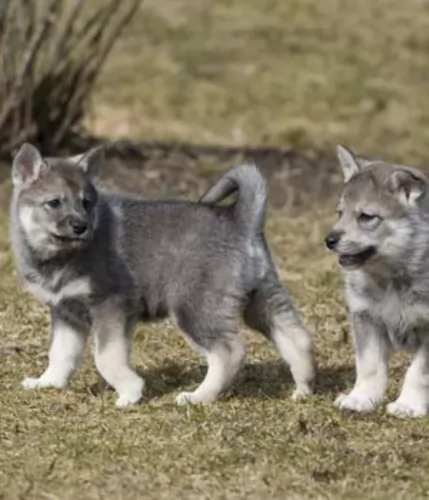 While the Jämthund is a healthy dog breed and won't cost you much in veterinary bills when it comes to illness, there are some common dog illnesses that are worth knowing about so you can respond in time to his need.
While the Jämthund is a healthy dog breed and won't cost you much in veterinary bills when it comes to illness, there are some common dog illnesses that are worth knowing about so you can respond in time to his need.
Unfortunately this is a joint problem that can affect even young dogs. The hip joint hasn't formed properly and it can lead to the development of painful arthritis. It can be a debilitating disease for your dog and you will need to see your vet.
This may seem like a trivial kind of dog illness but in fact it can lead to a lot of frustration, pain, anguish and discomfort for your pet. Signs of a skin allergy can include red, inflamed skin, itchiness, pain and oozing sores where your pet licks away miserably at the affected areas.
 Feed a high nutrition puppy food dry food made for an energetic breed. Feed 3 times a day ½-3/4 cup each time.
Feed a high nutrition puppy food dry food made for an energetic breed. Feed 3 times a day ½-3/4 cup each time.
Again feed a high nutrition adult food for an active breed. Feed twice a day 1-11/2 cups each time.
Outstanding health unless in a hunting accident.
The Harrier is an energetic, hunting breed that needs a lot of exercise on a daily basis. Long walks and jogging or running is good for the Harrier. If they are not working, hunting dogs they need more exercise. A fenced yard for playing is good. If this intense breed does not get enough exercise and mental stimulation, he needs there could be issues with destructive behavior and obesity. Flyball, tracking, agility, coursing, rally and hunting are great activities for this breed of dog. In addition, they are pack animals and do better in a family that has more than one dog.
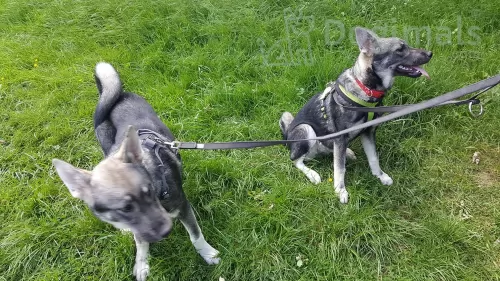 Your Jamthund is a high energy dog and because of his background of hunting and pulling sleds, he loves wide open spaces where he can run. He essentially suits country life and it wouldn't be wise to confine this energetic dog to a small home.
Your Jamthund is a high energy dog and because of his background of hunting and pulling sleds, he loves wide open spaces where he can run. He essentially suits country life and it wouldn't be wise to confine this energetic dog to a small home.
Brushing the thick coat twice a week will keep it in top condition.Keep his nails trimmed and also keep an eye on his teeth. Find out how to make use of canine toothbrush and toothpaste to keep his teeth clean and free of plaque.
Such a high energy dog requires the very best food packed full of vitamins and minerals. Look for the best commercially manufactured food there is and add in some wholesome home-made food from time to time such as cooked chicken, rice and vegetables as well as some raw meat occasionally. He must have a constant supply of fresh, cool water.